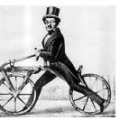<篇章結構>[題組:第31-35題]35.
Copernicus, founder of modern astronomy, was born in 1473 to a well-to-do merchant family in Torun, Poland. He was sent off to attend university in Italy, studying mathematics and optics, and canon law. Returning from his studies abroad, Copernicus was appointed to an administrative position in the cathedral of Frauenburg. There he spent a sheltered and academic life for the rest of his days.
31 He made his observations from a tower situated on the protective wall around the cathedral. His observations were made with the “bare eyeball,” so to speak, as a hundred years were to pass before the invention of the telescope. In 1530, Copernicus completed his famous work De Revolutionibus, which later played a major role in changing the philosophical view of humankind’s place in the universe. 32
Copernicus died in 1543 and was never to know what a stir his work would cause. In his book, he asserted that the Earth rotated on its axis once daily and traveled around the Sun once yearly. 33 People then regarded the Earth as stationary, situated at the center of the universe, with the Sun and all the planets revolving around it. Copernicus’ theory challenged the long-held belief that God created the Heavens and the Earth, and could overturn the core values of the Catholic world. 34 Other ministers quickly followed suit, saying of Copernicus, “This fool wants to turn the whole art of astronomy upside down.”
Ironically, Copernicus had dedicated his work to Pope Paul III. 35 The Church ultimately banned De Revolutionibus, and the book remained on the list of forbidden reading material for nearly three centuries thereafter.
(A) Meanwhile, Copernicus was a lifelong member of the Catholic Church.
(B) The book, however, wasn’t published until two months before his death.
(C) If this act was an attempt to seek the Catholic Church’s approval, it was of no use.
(D) This went against the philosophical and religious beliefs held during medieval times.
(E) Religious leader Martin Luther voiced his opposition to the sun-centered system model.
(F) In his spare time, Copernicus studied the stars and the planets, applying his math knowledge to the mysteries of the night sky.


